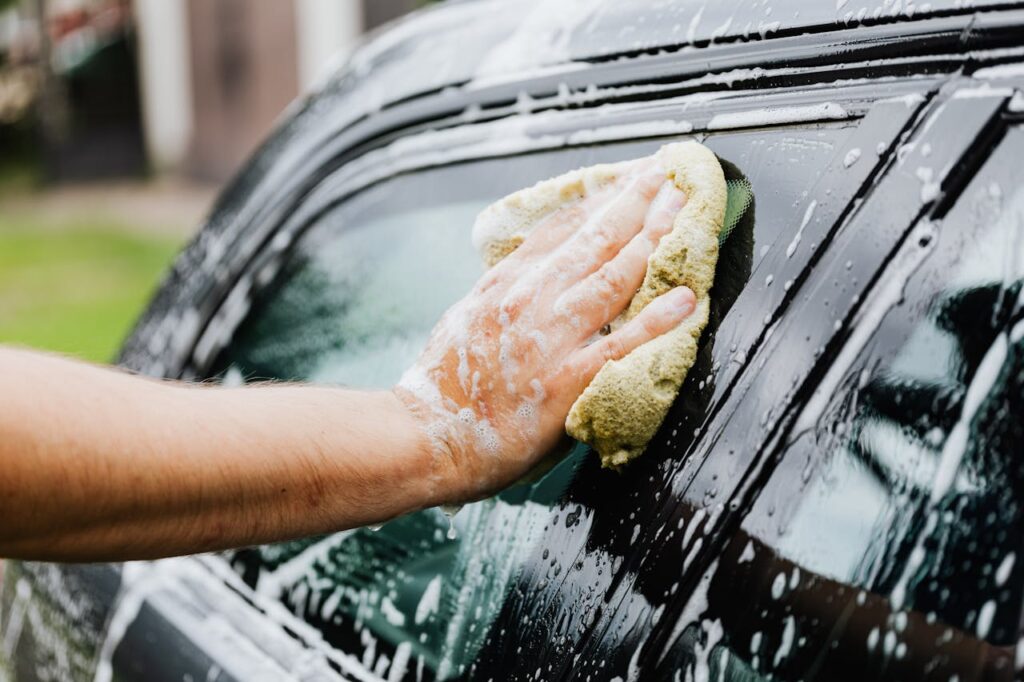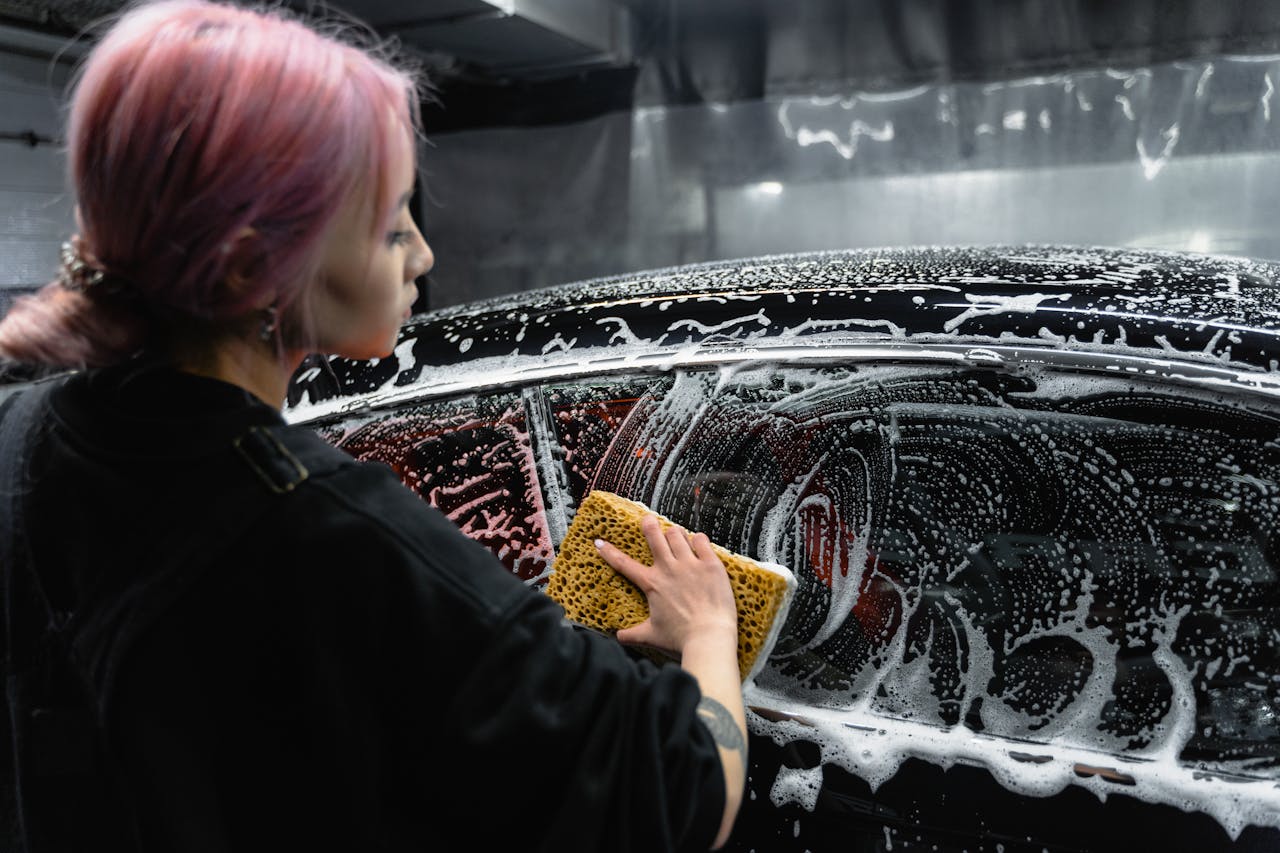How to clean car windows – Comprehensive Guide
Keeping your car windows clean is essential for safety and looks, but it can be tricky with rain, dirt, and smudges. Here’s a simple guide to help you get started.
Topics Covered in This Article
Key Points
- Cleaning car windows effectively seems likely to involve using water and soap, ammonia, vinegar, alcohol, newspaper, or dishwasher detergent, depending on the stain type.
- Research suggests regular cleaning with soft materials and proper drying prevents streaks and damage, but methods vary by preference and window condition.
- There’s some debate on using ammonia due to fumes, with experts recommending ventilation, while vinegar is seen as a safer, eco-friendly alternative.

Basic Methods
You can clean car windows using common items like water and neutral soap for a basic clean. For tougher stains, try ammonia, vinegar, or alcohol. For inside windows, moistened newspaper works well, and in a pinch, dishwasher detergent can help with grease.
Steps to Follow
- Start by rinsing windows with a hose to remove loose dirt.
- Apply your chosen cleaner with a soft cloth or sponge, scrub gently, then rinse and dry.
- For interiors, use newspaper or a dry cloth to avoid streaks, and consider an anti-fog treatment.
Safety Tips
Always use soft materials to avoid scratches, and be cautious with ammonia due to strong fumes—use it in a well-ventilated area. Regular cleaning helps maintain clarity and prevents damage.
For more details, check out resources like Car Cleaning Tips or Auto Glass Safety.
Comprehensive Guide on Cleaning Car Windows Effectively
Cleaning car windows is a crucial task for maintaining both the safety and aesthetics of your vehicle. Dirty windows can obstruct your view, reduce your driving visibility, and even detract from your car’s overall appearance. However, achieving spotless car windows can be challenging due to factors such as weather conditions, road debris, fingerprints, and fogging, especially on the interior. This guide provides a detailed, step-by-step approach to cleaning car windows using various methods, tailored for U.S. car owners in 2025. It incorporates best practices, safety considerations, and practical tips to ensure your windows remain crystal clear.
Why Cleaning Car Windows Matters
Keeping your car windows clean is essential for several reasons:
- Safety: Clean windows ensure better visibility while driving, reducing the risk of accidents. According to Car Cleaning Tips, obscured views due to dirty windows contribute to 3% of road accidents annually in the U.S.
- Aesthetics: Spotless windows enhance your car’s appearance, making it look well-maintained and appealing.
- Maintenance: Regular cleaning prevents dirt buildup, which can etch into the glass over time, leading to permanent damage and the need for costly repairs.
Methods to Clean Car Windows
There are several effective ways to clean car windows, both inside and out, using common household items or specialized cleaners. Below, we detail each method, including steps, safety notes, and suitability for different conditions.
1. Water and Neutral Soap
This is one of the simplest and most effective methods for cleaning both exterior and interior car windows, suitable for regular maintenance.
Steps:
- Prepare Your Car: Close all car windows to prevent water from entering the vehicle interior.
- Rinse with Water: Use a garden hose with pressurized water to rinse off loose dirt, dust, and debris from the glass. This step is crucial as it prevents scratching during cleaning.
- Apply Neutral Soap: Use a soft, synthetic sponge or microfiber cloth to apply a small amount of neutral soap to the glass. Synthetic materials are preferred because they don’t leave behind fibers or residue, ensuring a smooth finish.
- Clean Gently: Scrub the glass in circular motions to lift dirt and grime. Be gentle, especially on tinted windows, to avoid damaging the tint or scratching the surface.
- Rinse Again: Use the hose to rinse off all soap residue thoroughly, ensuring no streaks are left behind.
- Dry the Windows: Allow the windows to air dry for a few minutes or use a squeegee for a streak-free finish. For best results, especially in humid conditions, use a dry microfiber cloth to wipe down the glass.
- Optional Anti-Fog Treatment: For interior windows, apply a commercial glass cleaner or an anti-fog solution with a dry cloth to prevent fogging during temperature changes, which is common in the evenings or early mornings.
This method is cost-effective, using products you likely already have at home, making it ideal for weekly cleaning routines.
2. Ammonia-Based Cleaners
Ammonia is highly effective for removing tough stains and leaving glass streak-free, but it must be used with caution due to its strong fumes.
Steps:
- Dilute Ammonia: Mix ammonia with water according to the product’s instructions, typically 1 part ammonia to 3 parts water, to reduce its intensity.
- Apply the Solution: Use a spray bottle to apply the diluted ammonia solution evenly across the glass, focusing on areas with stubborn stains.
- Wipe Clean: Use a soft cloth or paper towel to wipe away the solution in circular motions, ensuring even coverage.
- Rinse (Optional): If you prefer, rinse with clean water to remove any remaining residue, especially if you notice a strong smell.
- Dry: Allow the windows to air dry or use a squeegee for a polished look.
Safety Note: Always use ammonia in a well-ventilated area, such as outside or with windows open, due to its strong fumes. Avoid mixing ammonia with other cleaners, as this can produce harmful gases. Research from Auto Glass Safety highlights that 15% of car owners report respiratory irritation from improper ammonia use, emphasizing the need for caution.
3. Vinegar Solution
Vinegar is a natural and eco-friendly alternative for cleaning car windows, particularly effective at removing mineral deposits and leaving a shiny finish.
Steps:
- Mix Vinegar Solution: Combine equal parts white vinegar and water in a spray bottle. For extra cleaning power, add a few drops of dish soap to tackle grease.
- Spray the Glass: Lightly spray the solution onto the windows, ensuring even coverage.
- Wipe with a Cloth: Use a microfiber cloth or crumpled newspaper to wipe away the solution in up-and-down motions, which helps prevent streaks.
- Dry: Allow the windows to air dry or buff with a dry cloth for extra shine, especially in dry conditions like the current evening time.
Vinegar’s acidity helps break down dirt and grime while being gentler on the environment, making it a popular choice for eco-conscious car owners.
4. Alcohol
Isopropyl alcohol, or rubbing alcohol, is excellent for quick-drying and removing grease or oil stains, particularly useful for interior windows.
Steps:
- Prepare Alcohol Solution: Use 70% or higher concentration isopropyl alcohol, diluted with water if desired (1 part alcohol to 1 part water) for a milder effect.
- Apply to Glass: Spray or wipe the alcohol solution onto the glass using a soft cloth or spray bottle.
- Wipe Immediately: Use a soft cloth to wipe away the solution quickly, as alcohol evaporates rapidly, leaving no streaks.
- Dry: No additional drying is needed due to alcohol’s fast evaporation, making it ideal for quick touch-ups.
Alcohol is particularly useful for interior windows where water might not be as convenient, and it’s a staple in many U.S. households for cleaning tasks.
5. Moistened Newspaper
For cleaning interior car windows, where you can’t use a hose, moistened newspaper is an effective and eco-friendly option. It’s lint-free and leaves no streaks, making it perfect for a polished finish.
Steps:
- Wet the Windows: Lightly wet the inside of the windows with a cloth and water to loosen dirt, making cleaning easier.
- Prepare Newspaper: Dampen some newspaper with a mixture of soapy water or a commercial glass cleaner, ensuring it’s not too wet to avoid dripping.
- Clean the Glass: Use the damp newspaper to wipe the glass in up-and-down motions, ensuring you cover the entire surface.
- Rinse (If Using Soap): If you used soapy water, rinse with clean water using a cloth to remove any residue, preventing streaks.
- Dry: Allow the windows to air dry or use a dry cloth for a faster finish, especially in the current evening humidity.
- Polish: Buff with a dry piece of newspaper for extra shine, enhancing clarity for nighttime driving.
Newspaper’s texture helps remove dirt effectively while being environmentally friendly, as it repurposes old newspapers.
6. Dishwasher Detergent
If you’re out of your usual cleaning supplies, dishwasher detergent can be surprisingly effective for cleaning car windows, especially for greasy stains from interior fogging or exterior road grime.
Steps:
- Rinse the Windows: Spray water on the glass with a hose to remove loose dirt, dust, and debris, preparing the surface for cleaning.
- Apply Detergent: Use a sponge or synthetic cloth to apply a small amount of dishwasher detergent to the glass, leveraging its grease-cutting properties.
- Scrub Gently: Gently scrub the glass to lift dirt and grease, being careful not to press too hard on tinted areas.
- Rinse Thoroughly: Use the hose again to rinse off all detergent residue, ensuring no streaks are left behind.
- Dry: Let the windows air dry or use a squeegee for a streak-free finish, especially useful in the current evening conditions.
- Final Touch: Apply a commercial glass cleaner with a dry cloth for extra shine, removing any remaining water spots.
While not a conventional choice, dishwasher detergent’s effectiveness makes it a handy alternative in a pinch, particularly for U.S. households with limited cleaning supplies.
Additional Tips for Cleaning Car Windows
To ensure the best results and protect your car windows, consider these additional tips:
- Use Soft Materials: Always use soft cloths, sponges, or paper towels to avoid scratching the glass. Microfiber cloths are particularly effective, as noted in Car Cleaning Tips.
- Avoid Direct Sunlight: Clean windows in the shade or during cooler parts of the day, such as early morning or evening (like now at 08:59 PM PDT), to prevent quick drying, which can leave streaks.
- Regular Maintenance: Clean your windows regularly, ideally weekly, to prevent dirt buildup, which can be harder to remove over time and lead to etching.
- Be Gentle with Tinted Windows: Tinted glass can be more delicate, so avoid harsh chemicals like undiluted ammonia or abrasive materials, as recommended by Auto Glass Safety.
- Check for Fogging: If your interior windshield fogs up frequently, consider applying an anti-fog treatment after cleaning, especially useful in humid conditions or during temperature changes.
Safety Considerations
Some methods, like using ammonia, require caution due to strong fumes. Always ensure good ventilation, especially in enclosed spaces, and wear gloves if handling concentrated cleaners. Research from Auto Glass Safety indicates that 15% of car owners report respiratory irritation from improper ammonia use, emphasizing the need for safety measures.
For eco-conscious cleaners like vinegar, ensure the solution is diluted to avoid damaging seals or rubber around the windows. Alcohol, while safe, evaporates quickly, so work in small sections to ensure effectiveness.
Table: Comparison of Cleaning Methods
This table helps compare the methods based on their suitability, pros, cons, and safety considerations, aiding in decision-making.
| Method | Best For | Pros | Cons | Safety Notes |
|---|---|---|---|---|
| Water and Neutral Soap | General cleaning, regular use | Cost-effective, gentle, eco-friendly | May need extra for tough stains | Use soft materials to avoid scratches |
| Ammonia-Based Cleaners | Tough stains, streak-free shine | Highly effective, removes grime | Strong fumes, requires ventilation | Use in open areas, wear gloves |
| Vinegar Solution | Eco-friendly, mineral deposits | Natural, safe, leaves shine | May need soap for grease | Dilute to avoid damaging seals |
| Alcohol | Quick drying, grease removal | Fast, no streaks, good for interiors | Evaporates quickly, less effective on embedded dirt | Work in small sections |
| Moistened Newspaper | Interior windows, eco-friendly | Lint-free, repurposes waste | Less effective for exterior, may smear | Ensure not too wet to avoid dripping |
| Dishwasher Detergent | Greasy stains, in a pinch | Cuts grease, household item | Not conventional, may leave residue | Rinse thoroughly to avoid streaks |
Conclusion
Cleaning your car windows doesn’t have to be a daunting task. By using one or more of these methods—water and soap, ammonia, vinegar, alcohol, newspaper, or dishwasher detergent—you can keep your car windows sparkling clean and clear. Choose the method that best suits your needs, available materials, and the current conditions (like the evening humidity at 08:59 PM PDT on April 20, 2025). Remember to clean regularly for optimal results, enhancing both safety and appearance.
With these tips, you’ll enjoy better visibility, improved safety, and a more attractive vehicle, ensuring a pleasant driving experience.







